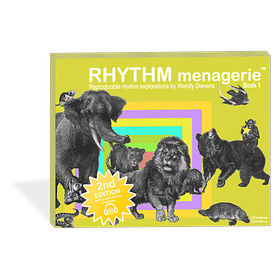Limits are essential to creativity. This is something I’ve observed in my own composing and teaching countless times. When you’re teaching creativity, setting appropriate limits (e.g. a scale or a rhythm) prevents students from feeling overwhelmed. Indeed, these limits are often inspiring: I frequently find that my most interesting ideas come when I have only 5 minutes to spare.
Three fascinating blog posts popped into my inbox this weekend that explore this topic in different ways:
Simeon Walker, a successful pianist-composer, shared a work-in-progress and commented about the importance of accepting his own limits: “I have a much stronger idea now than I’ve ever had of what I am not, and what I have not become, which—strange, though it seems—enables me to have much more confidence in myself and what I can do, by virtue of an awareness of what I’m not as good at.”
Andrew Eales, a successful piano teacher, writer and editor, talks about the importance of helping students work within their limits and remarks: “our limits are not ultimately fixed, but simply our present reality. With patience and persevering practice, we naturally erode them over time, cutting a new path that reshapes the course of our journey, just as rivers change theirs.”
And Jeff Beal, a successful composer, commented in an interview with Rhonda Rizzo that his multiple sclerosis—a disease that can severely limit people’s lives—was actually more easy to control when he took steps to reduce the stress in his life and instead to play piano more frequently.
I’ve used the word “successful” 3 times there, quite deliberately. All these people are successful, albeit in different ways. One of them has won 5 Emmy awards, another has an ongoing book deal with a major publisher and is often invited to teach at piano schools, another regularly receives Arts Council funding and is a popular live performer regularly touring Europe. The difference of their success has come, I would argue, by leaning in to what makes them themselves, by carving a niche that reflects their strengths.
To expand on one example, Simeon Walker is a natural on stage: funny, gregarious, charming. I’ve performed with him several times and I’m always struck by the difference between us. Whereas I have to work really hard not to be intimidated by the situation, he seems to become more himself. Performing simply suits him more than it suits me, and I decided a while ago that I wasn’t going to try to perform as frequently as he does. Instead I’m focusing on where my strengths lie.
And I think that’s the biggest challenge: figuring out what is it that makes you, You. Almost anyone can learn the skills required to compose, given enough time. But it’s only by discovering and cultivating your uniqueness—and I’m speaking directly to you, reader, when I say that you are unique, you have something to say—it’s only then that the magic happens.
What I’ve enjoyed recently:
Speaking of someone who has figured out what makes them unique, classicist Edith Hall gave a fascinating and inspiring interview to BBC Radio 3’s Private Passions about how she has tied her academic work to her family history of depression and suicide in her new book Facing Down the Furies: Suicide, the ancient Greeks and Me.
What I’ve published recently:
Cultivating confidence
Accessible ways to build your confidence at teaching improvisation and composition
Scales: the creative foundation
Inspired by Lewis Kesterton’s new book The Pianist’s Guide to Scale Mastery, I gathered 6 resources that will help your students enjoy scales and inspire improvisations and compositions
Creative introduction to Prelude VII by Barbara Arens
Creative activities to inspire your students and introduce them to this gorgeous piece!
What’s in the drafts folder:
A creative introduction to a piece by the wonderful Melanie Spanswick
An interview with Professor Karen Schlimp, author of Impromosaik
A creative introduction to a piece from Little Moods by Kerstin Strecke
An exploration of the incredibly useful teaching book Piano By Ear by Lucinda Mackworth-Young
A creative introduction to Gigue by William Arnold











Thank you for including my interview of the successful Jeff Beal in this excellent article. Yes, yes, yes to knowing and embracing limitations. A bit of advice I received from a jazz teacher years ago has guided me in more than just music: “stay within yourself.” It has saved me from trying to be something that I’m not more than once…
Well, this is a most lovely thing to read about oneself. Thank you, friend 😊